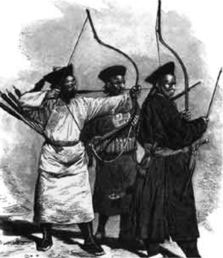[EN/ES/CH] Guiping, Guangxi: The Taiping Rebellion
- [EN/ES] Today in Chinese History (28 August 2014): Shakespeare and the Taichang Emperor - 28 agosto, 2019
- [EN/ES/CH] Guiping, Guangxi: The Taiping Rebellion - 19 marzo, 2019
- [EN/ES/CH] Guangzhou, Guangdong: Foreign trade - 25 febrero, 2019
(originally published in My China Roots)
[EN]
The Taiping Rebellion is one of the most under-recognized events in world history, both in terms of scale and impact. It devoured over 20 million lives and sowed the seeds for the founding of China’s Communist Party, whose actions today impact every corner of the planet. It also caused hundreds of thousands Chinese to flee and start new lives abroad.
Hong Xiuquan
The Taiping Rebellion started in 1851 and was led by Hakka Chinese Christian fundamentalist Hong Xiuquan, who believed he was the younger brother of Jesus Christ. Less than ten years earlier, China’s loss of the First Opium War had triggered the start of the country’s ‘century of humiliation’, in which ‘barbaric’ foreign powers repeatedly forced their will upon the weak, corrupt, and inward looking Qing rulers.
Hong Xiuquan sought to restore order and pride, and set out to build a ‘Heavenly Kingdom’. His peasant uprising fought against foreign influence, feudalism, and traditional concepts such as Confucianism and Buddhism, while advocating equality for women and common ownership of land and resources. The rebellion erupted in Guangxi province and quickly spread throughout southern China.
Pushing Chinese overseas
Almost toppling the Qing dynasty, the rebellion was finally suppressed in 1867 with help from the British and the French. With the Qing rulers aiming to exterminate all rebels, including their wives and children, numerous insurgents changed their names or fled, while tens of thousands of common people had already left the devastated country. People went everywhere from California to Calcutta, and countless rebels were shipped off as coolies to places such as Indonesia, Cuba, or Peru.
[ES]
La Rebelión Taiping es uno de los eventos menos reconocidos de la historia mundial, tanto en términos de escala como de impacto. Devoró más de 20 millones de vidas y sembró la semilla para la fundación del Partido Comunista de China, cuyas acciones actualmente afectan a todos los rincones del planeta. También causó que cientos de miles de chinos huyeran y comenzaran una nueva vida en el extranjero. Hong Xiuquan La Rebelión Taiping comenzó en 1851 y fue dirigida por el chino hakka Hong Xiuquan, un cristiano fundamentalista que creía que era el hermano menor de Jesucristo. Poco menos de diez años atrás, la derrota china en la Primera Guerra del Opio había desencadenado el inicio de “el siglo de las humillaciones” en el país. En este período las potencias extranjeras “bárbaras” doblegaron repetidamente la voluntad de los débiles, corruptos e intransigentes gobernantes Qing. Hong Xiuquan trató de restaurar el orden y el orgullo proponiéndose construir un “Reino Celestial”. Su levantamiento campesino se enfrentó a la influencia extranjera, el feudalismo y a conceptos tradicionales como el confucianismo y el budismo al tiempo que abogaba por la igualdad con las mujeres y la propiedad común de la tierra y los recursos. La rebelión estalló en la provincia de Guangxi y se extendió rápidamente por todo el sur de China. Expulsando los chinos al ultramar Habiendo estado cerca de derrocar a la dinastía Qing, la rebelión fue finalmente suprimida con la ayuda de británicos y franceses en 1867. Debido a que los gobernantes Qing se habían propuesto exterminar a todos los rebeldes (esposas e hijos incluidos), numerosos insurgentes cambiaron sus nombres o huyeron. A la par, decenas de miles de personas normales y corrientes ya habían abandonado el devastado país. Los lugares a los que huyeron van de California a Calcuta, y un sinnúmero de rebeldes fueron enviados como culíes a lugares como Indonesia, Cuba o el Perú.
太平天国运动无论从其规模和影响力来说,都堪称世界历史上最为著名的起义之一。这场运动牺牲了两千万人的生命,并为中国共产党的诞生播下了种子,其行为主张至今仍影响着地球上的每一处角落。而这场运动也导致了成千上万的中国人逃亡海外,追寻新的生活。
洪秀全
太平天国运动始于1851年,由信仰中国基督教原教旨主义的客家人洪秀全率领,洪秀全相信他就是耶稣基督的兄弟。在不足十年之前,中国在第一次鸦片战争中战败,让中国就此进入了“百年国耻”的时代。在此期间,野蛮的外国入侵者将自身的意愿强加于弱小、腐败和落后的清朝统治者。
于是洪秀全决定恢复秩序,振奋民心,建立起一个“天国”。他率领追随他的农民们起身反抗外国势力、封建主义和传统观念,诸如儒学与佛学。并提倡妇女平等,倡导平均分配土地等资源。起义在广西发动,并迅速扩展到大部分中国南部地区。
迫使中国人逃亡海外
太平天国运动几乎推翻了清王朝。但是,凭借英法势力的帮助,清政府于1867年将这次起义镇压。清朝统治者力图清剿所有起义农民及其妻儿,于是这些叛乱分子或改名换姓,或四处流亡。同时,也有成千上万的人选择了离开这个满目疮痍的国家。
他们逃亡到世界各地,从加利福尼亚到加尔各答,无数参与起义的农民被当做苦力运往印尼,古巴,秘鲁等地。



No hay comentarios